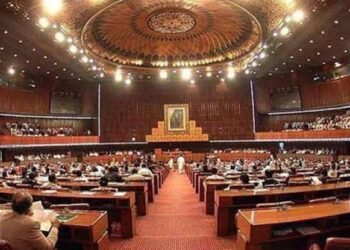NEW YORK; Prime Minister Shehbaz Sharif on Wednesday said Pakistan was on track to fulfil its commitments under the International Monetary Fund’s (IMF) ongoing programme but stressed that the devastating impact of recent floods must be reflected in the lender’s forthcoming review.
The remarks came during a meeting with IMF Managing Director Kristalina Georgieva on the sidelines of the 80th session of the United Nations General Assembly in New York.
According to a Topline Securities report, Pakistan is expected to meet all seven Quantitative Performance Criteria (QPC) set by the IMF before the September 25 review of its $7 billion Extended Fund Facility (EFF), approved earlier this year. The review will gauge Pakistan’s performance during the March–June 2025 quarter.
Despite these positive indicators, the prime minister noted that unprecedented flooding had caused widespread damage across rural and industrial regions, inflicting losses worth billions of dollars. The floods have undermined food supplies, exports, and the fragile path to economic recovery.
A statement issued by the Press Information Department (PID) quoted Sharif as saying that while Pakistan continued to progress towards meeting its IMF obligations, “the impact of the recent floods on Pakistan’s economy must be factored into the IMF’s review.”
The government had earlier forecast a growth rebound of 4.2 percent in 2026, supported by agriculture and manufacturing after macroeconomic stabilisation under IMF assistance. However, record monsoon rains since June—exacerbated by dam releases from India—have submerged large portions of Punjab and Sindh, challenging those projections.
Officials and analysts warn that the damage could surpass the 2022 floods, when a third of the country was underwater, given the simultaneous blows to farming and industry. Data from the agricultural monitoring body GEOGLAM suggests that between August 1 and September 16, at least 220,000 hectares of rice fields were inundated. The Punjab Provincial Disaster Management Authority further reported that 1.8 million acres of farmland are underwater.
According to the PID, Georgieva expressed her condolences to the flood-affected population and underlined the importance of thorough damage assessments to help frame recovery priorities. She commended Prime Minister Sharif’s pursuit of sound economic policies and reaffirmed the IMF’s commitment to supporting Pakistan’s reform agenda, aimed at ensuring long-term sustainable growth.
During the meeting, Sharif also acknowledged the IMF’s longstanding engagement with Pakistan and its timely interventions, including the $3 billion Stand-By Arrangement in 2024, followed by the $7 billion EFF and a $1.4 billion Resilience and Sustainability Facility. He said deep-rooted structural reforms were beginning to stabilise the economy and steer it towards recovery.
Meeting with World Bank President
Separately, Sharif also held discussions with World Bank (WB) Group President Ajay Banga. According to another PID release, the prime minister appreciated the bank’s continued assistance and briefed Banga on Pakistan’s comprehensive reform programme covering resource mobilisation, energy reforms, privatisation, and climate resilience.
He praised the World Bank’s new $40 billion Country Partnership Framework (CPF) for Pakistan and pledged to ensure its effective implementation in coordination with provincial governments. Banga, in turn, welcomed Pakistan’s reform efforts and confirmed the bank’s readiness to back both economic reforms and long-term climate initiatives under the CPF.
Both sides reaffirmed their commitment to strengthening cooperation in support of Pakistan’s development priorities.




































































